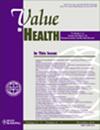Using Outcome Information During Consultation Yields Better Shared Decision Making, Better Patient Experiences, and More Positive Expectations: A Comparative Effectiveness Study
IF 4.9
2区 医学
Q1 ECONOMICS
引用次数: 0
Abstract
Objectives
Value-based healthcare has recently gained recognition. Part of this framework uses the outcome information from daily care. This study evaluated the effects of patients’ perceived use of outcome information on shared decision making, patient experiences with healthcare, treatment credibility, and outcome expectations.
Methods
Data were collected from 25 hand surgery and therapy clinics. We created 2 groups based on whether patients indicated that outcome information was used (Outcome Information group) or not (control group) during the clinician consultation. Patients’ experiences with healthcare were assessed after the first consultation using a digitally distributed patient-reported experience measure and a questionnaire to measure treatment credibility and expectations. Confounders were controlled for using propensity score matching in a 3:1 ratio. We calculated Cliff’s delta as an effect size measure (0.11-0.27 small, 0.28-0.42 medium, and >0.43 large).
Results
After propensity score matching, we included 636 patients in the Outcome Information group and 212 in the control groups, respectively. The Outcome Information group experienced more shared decision making (Cliff’s delta 0.33 [0.24-0.40], P < .001) and scored better on all patient-reported experience measure items. Patients in the Outcome Information group had more positive expectations of the treatment outcome (Cliff’s delta: 0.21 [0.12-0.29], P < .001) and found their treatment more credible (Cliff’s delta: 0.26 [0.18-0.34], P < .001) than those in the control group.
Conclusions
The perceived use of outcome information by patients leads to more shared decision making, better experiences with healthcare, and more positive outcome expectations and treatment credibility. Therefore, we recommend the use of outcome information in daily care to fulfill the promise of value-based healthcare.
求助全文
约1分钟内获得全文
求助全文
来源期刊

Value in Health
医学-卫生保健
CiteScore
6.90
自引率
6.70%
发文量
3064
审稿时长
3-8 weeks
期刊介绍:
Value in Health contains original research articles for pharmacoeconomics, health economics, and outcomes research (clinical, economic, and patient-reported outcomes/preference-based research), as well as conceptual and health policy articles that provide valuable information for health care decision-makers as well as the research community. As the official journal of ISPOR, Value in Health provides a forum for researchers, as well as health care decision-makers to translate outcomes research into health care decisions.
 求助内容:
求助内容: 应助结果提醒方式:
应助结果提醒方式:


